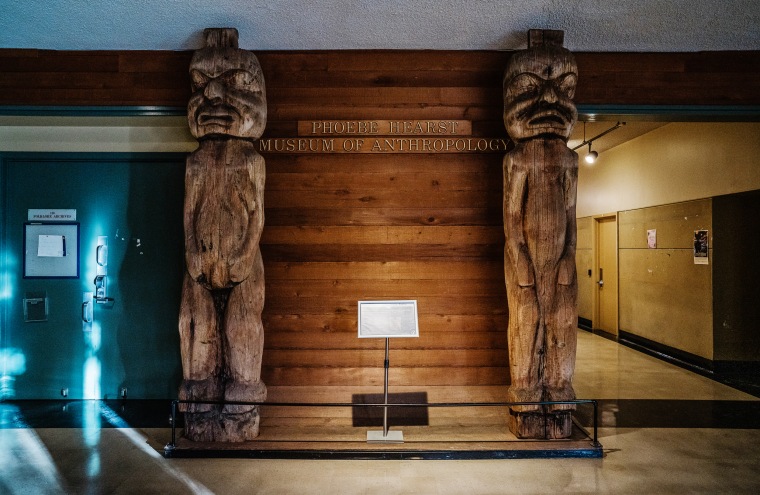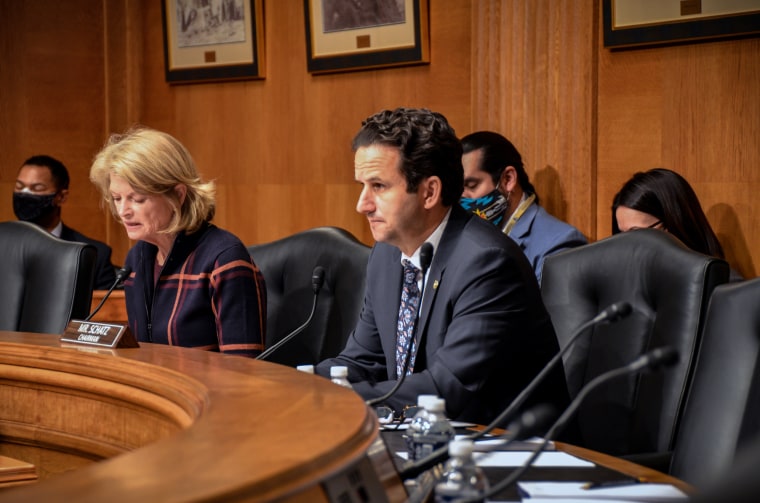This article was published in partnership with ProPublica, a nonprofit newsroom that investigates abuses of power. Sign up to receive ProPublica’s biggest stories as soon as they’re published.
More than a dozen senators are pressing for the museums and universities that hold the most Native American remains to explain why they’ve failed for decades to return thousands of them to tribes as required by federal law.
Members of the Senate Committee on Indian Affairs and other senators singled out for scrutiny the five institutions identified in a recent ProPublica and NBC News investigation as having the largest collections of Indigenous remains — including powerful and prestigious universities with long legacies of delaying repatriation requests.
“It’s inexcusable, it’s immoral, it’s hypocritical, and it has to stop,” said committee chair Brian Schatz, D-Hawaii.
In letters sent Thursday to the University of California, Berkeley, Harvard University, the Ohio History Connection, the Illinois State Museum and Indiana University, the senators called the slow pace of repatriations of Native American remains and belongings under the 1990 federal law “unacceptable.”
“For too long, Native ancestral remains and cultural items have been unconscionably denied their journey home by institutions, desecrated by scientific study, publicly displayed as specimens, left to collect dust on a shelf, or simply thrown in a box and forgotten in a museum storeroom,” the senators wrote.
More than 30 years ago, Congress passed the Native American Graves Protection and Repatriation Act, or NAGPRA, requiring federally funded museums, universities and government agencies to identify human remains they believe to be Native American and then work with tribal nations to repatriate them.
Lawmakers expected the process would be completed or nearly completed within five years, the senators said in the letter, yet “a daunting amount of work remains.”
Hundreds of institutions nationwide still hold a total of more than 100,000 ancestral remains, according to the news organizations’ analysis of federal data. None has more than UC Berkeley, with 9,000, followed by the Illinois State Museum and the Ohio History Connection.

The senators wrote that Congress “continues to receive troubling testimony” about institutions’ poor compliance with the law, including insufficient consultation with tribes, poor tracking and misidentification of items, disrespect for traditional knowledge and allegations of avoiding or slowing repatriation efforts.
In response to the news organizations’ request for comment on the senators’ letter, UC Berkeley said in a statement that it will cooperate in a “fully transparent manner” with the Senate’s requests. It apologized for the harm caused by its inaction and said repatriation is now a top priority.
“We accept responsibility and accountability for the university’s past failings and errors in so far as repatriation and tribal relations are concerned,” it added.
A spokesperson for the Ohio History Connection said it welcomed the senators’ attention to NAGPRA, adding in a statement: “This work requires many resources and time commitments — for both institutions like ours and the federally recognized Tribes — to undertake repatriation on such a large scale.”
Fred Cate, Indiana University’s vice president for research, said the school had assigned six staff members in recent years to work on NAGPRA compliance. “The whole point is to get to a consensus point with the tribes we’re working with,” which takes time, he said.
Harvard and the Illinois State Museum did not comment Thursday; Harvard has previously issued an apology for past collection practices, and the Illinois museum said it developed plans to speed compliance with NAGPRA.
In the letters, the senators asked the universities and museums to respond to a list of written questions within two months, including how they decide whether to grant or deny tribes’ requests and how long they take to make decisions.
The senators cited an expert’s recent estimate that it could take 70 more years for institutions to complete the repatriation process. “This is simply unacceptable,” they wrote of the estimate by Chip Colwell, who as curator of the Denver Museum of Nature & Science oversaw its repatriation efforts.
Meanwhile, the Interior Department recently estimated the process could take 26 more years, based on institutions’ progress in the past decade. Schatz said he wants it done much sooner. “It can’t take another decade or two for this to get fixed,” he said.
The Interior Department this year is reviewing proposed regulations that would push museums and universities to finish the work within three years, which some institutions have argued is not feasible.
Edward Halealoha Ayau, the chair of the NAGPRA Review Committee, said museums have too often skirted the mandate to consult with Indigenous people. Many institutions rely only on their own records and do not review evidence rooted in tribal traditions and knowledge when they decide on claims, he added.
“You can’t just sit in the corner twiddling your thumbs, saying, ‘Oh, we don’t know whose ancestors these are,’” he said.
Ayau said the senators’ letter sends a message to the hundreds of other institutions that also must comply with NAGPRA.
The senators also asked the institutions what actions the government has taken against them under the law and the steps they took in response. Penalties are rare, federal data shows. Only 20 institutions have been fined under the law — for an average of $2,955 per institution, according to the latest available data from 2022. Of the five institutions that received a letter from the Senate, only Harvard and UC Berkeley have been cited, and they were not required to pay fines.
Schatz said he hoped the letter would encourage the institutions to speed up their compliance with the law.
“If there are deans and presidents and boards of trustees who are sitting around, trying to figure out how to live their values, this is a very practical, immediate way to start,” he said.
Schatz added that he expects the institutions will respond to the senators’ questions but that if they do not, the committee has the power to subpoena them.

